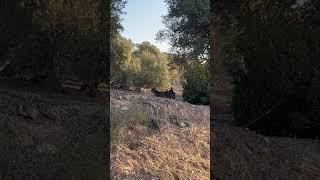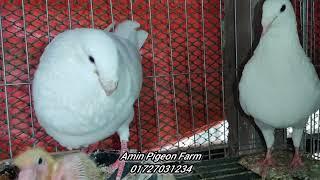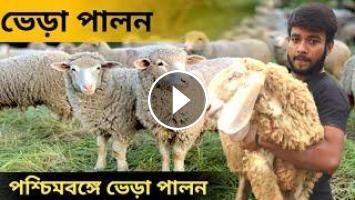পশ্চিমবঙ্গে ভেড়া পালন || Sheep farming in West Bengal || Sheep farm|| ভেড়ার খামার????????????????????????????????????????????????????????????????????????????????????????????????????????????????????????????????????
????
খামারির ঠিকানা - হাবরা,উত্তর ২৪ পরগনা,
যোগাযোগ -9674893341/9067345582
Sheep farming in West Bengal, a state in eastern India, is primarily focused on the rearing of indigenous sheep breeds. Let's explore some key aspects of sheep farming in West Bengal:
Indigenous Breeds: West Bengal is home to several indigenous sheep breeds that are well adapted to the local climatic conditions. Some of the common sheep breeds in the region include the Garole, Malpura, Balangir, and Kendrapada.
Grazing and Feeding: Sheep farming in West Bengal involves both grazing and stall-feeding practices. The sheep are allowed to graze in open fields during the day, where they feed on grass, shrubs, and other vegetation. In the evenings, they are brought back to the farm and provided with supplementary feed, such as dry fodder, green fodder, and concentrates.
Housing and Shelter: Sheep require proper housing and shelter to protect them from extreme weather conditions and predators. In West Bengal, sheep farmers typically construct simple shelters or sheds using locally available materials like bamboo, thatch, or tin sheets. These shelters provide shade, protection, and a comfortable resting place for the sheep.
Healthcare and Management: Sheep farming in West Bengal involves regular healthcare and management practices to ensure the well-being of the animals. This includes vaccination against common diseases, deworming, regular check-ups by veterinarians, and proper hygiene and sanitation practices within the farm.
Wool Production: While the focus of sheep farming in West Bengal is primarily on meat production, the wool from indigenous breeds is also used for local textile crafts. The wool is usually coarse in texture and is suitable for making carpets, rugs, and blankets.
Marketing and Value Chain: Sheep farmers in West Bengal typically sell their sheep at local livestock markets, known as haats, or through direct sales to local meat suppliers. In recent years, efforts have been made to develop better marketing channels and value chains for sheep farmers, including the establishment of meat processing units and cooperative societies.
Government Initiatives: The Government of West Bengal has taken several initiatives to promote and support sheep farming in the state. This includes providing financial assistance, subsidies, and training programs to farmers, as well as infrastructure development for the sector.
Challenges: Like any agricultural activity, sheep farming in West Bengal faces certain challenges. Some of the common challenges include limited access to quality feed and grazing lands, lack of proper infrastructure, disease outbreaks, and market fluctuations.
It's important to note that specific details and practices may vary among individual sheep farmers in West Bengal based on their location, resources, and farming objectives. Local agricultural extension services or government agencies can provide more specific and up-to-date information for those interested in starting a sheep farm in West Bengal.
#Sheepfarm
#ajagro
#agriculture
#goatfarming
#sheep
#sheepfarming
#ভেড়া
#ভেড়াপালল
#ভেড়া
#ছাগল
#ভেড়া
#ভেড়া
????
খামারির ঠিকানা - হাবরা,উত্তর ২৪ পরগনা,
যোগাযোগ -9674893341/9067345582
Sheep farming in West Bengal, a state in eastern India, is primarily focused on the rearing of indigenous sheep breeds. Let's explore some key aspects of sheep farming in West Bengal:
Indigenous Breeds: West Bengal is home to several indigenous sheep breeds that are well adapted to the local climatic conditions. Some of the common sheep breeds in the region include the Garole, Malpura, Balangir, and Kendrapada.
Grazing and Feeding: Sheep farming in West Bengal involves both grazing and stall-feeding practices. The sheep are allowed to graze in open fields during the day, where they feed on grass, shrubs, and other vegetation. In the evenings, they are brought back to the farm and provided with supplementary feed, such as dry fodder, green fodder, and concentrates.
Housing and Shelter: Sheep require proper housing and shelter to protect them from extreme weather conditions and predators. In West Bengal, sheep farmers typically construct simple shelters or sheds using locally available materials like bamboo, thatch, or tin sheets. These shelters provide shade, protection, and a comfortable resting place for the sheep.
Healthcare and Management: Sheep farming in West Bengal involves regular healthcare and management practices to ensure the well-being of the animals. This includes vaccination against common diseases, deworming, regular check-ups by veterinarians, and proper hygiene and sanitation practices within the farm.
Wool Production: While the focus of sheep farming in West Bengal is primarily on meat production, the wool from indigenous breeds is also used for local textile crafts. The wool is usually coarse in texture and is suitable for making carpets, rugs, and blankets.
Marketing and Value Chain: Sheep farmers in West Bengal typically sell their sheep at local livestock markets, known as haats, or through direct sales to local meat suppliers. In recent years, efforts have been made to develop better marketing channels and value chains for sheep farmers, including the establishment of meat processing units and cooperative societies.
Government Initiatives: The Government of West Bengal has taken several initiatives to promote and support sheep farming in the state. This includes providing financial assistance, subsidies, and training programs to farmers, as well as infrastructure development for the sector.
Challenges: Like any agricultural activity, sheep farming in West Bengal faces certain challenges. Some of the common challenges include limited access to quality feed and grazing lands, lack of proper infrastructure, disease outbreaks, and market fluctuations.
It's important to note that specific details and practices may vary among individual sheep farmers in West Bengal based on their location, resources, and farming objectives. Local agricultural extension services or government agencies can provide more specific and up-to-date information for those interested in starting a sheep farm in West Bengal.
#Sheepfarm
#ajagro
#agriculture
#goatfarming
#sheep
#sheepfarming
#ভেড়া
#ভেড়াপালল
#ভেড়া
#ছাগল
#ভেড়া
#ভেড়া
- Catégories
- Chats de Race Bengal















Commentaires